Advance Praise for
Surviving the Survivors

Told in a clear and readable manner, this memoir is a chronicle of success and persistence in the face of great adversity. Surviving the traumas inflicted by parents who were irreparably damaged by the Holocaust cannot have been easy. Klein is very brave to have made her story public, and she is to be commended for the research she did to fill in the history of the times and the history of her family.
MARGARET L. KRIPKE, Professor Emerita, The University of Texas MD Anderson Cancer Center
In her debut memoir, Surviving the Survivors, author Ruth Klein, with both tenderness and candor, delves deeply into her familys dark and horrifying past as victims of the Holocaust. Though some miraculously survive despite the unimaginable, like Klein, each must bear witness to the many who do not.
SANDE BORITZ BERGER, author of The Sweetness
In her engrossing memoir Surviving the Survivors, Ruth Klein paints an accurate yet heart-wrenching picture of what it is like to grow up with parents who were irreparably damaged by the Holocaust. While every second-generation (2G) Holocaust survivors story is unique, there are threads of similarity that will leave other 2Gs, me included, nodding their heads in solidarity with Kleins experiences and behaviors. And her unfailingly positive outlook and drive to succeed will leave you cheering for her to the final word of her book.
EMILY WANDERER COHEN, member of the Jewish Book Council and author of From Generation to Generation: Healing Intergenerational Trauma Through Storytelling
I found this book very compelling; I read the entire book in one sittingjust could not put it down. It resonates with the history, feelings, and struggles of Holocaust survivors and the second generation. The highlight for me was the last chapter and its new character, ending this memoir as an affirmation of life.
JOYCE LEVINE, Secretary, American Gatherings of Adult Children of the Holocaust Survivors; Former Secretary, National Survivors of the Holocaust; and President, Manhattan Chapter of Women Holocaust Survivors
An engrossing, compelling storyit is profound, harrowing and intensely moving. This story needs to be told, it needs to be read, and it needs to be understood.
GRANT ARTHUR GOCHIN, author of Malice, Murder, and Manipulation

Copyright 2018 by Ruth Klein
All rights reserved. No part of this publication may be reproduced, distributed, or transmitted in any form or by any means, including photocopying, recording, digital scanning, or other electronic or mechanical methods, without the prior written permission of the publisher, except in the case of brief quotations embodied in critical reviews and certain other noncommercial uses permitted by copyright law. For permission requests, please address She Writes Press.
Published September 4, 2018
Printed in the United States of America
Print ISBN: 978-1-63152-471-4
E-ISBN: 978-1-63152-472-1
Library of Congress Control Number: 2018937060
For information, address:
She Writes Press
1563 Solano Ave #546
Berkeley, CA 94707
Interior design by Tabitha Lahr
She Writes Press is a division of SparkPoint Studio, LLC.
Names and identifying characteristics have been changed to protect the privacy of certain individuals.
In memory of Sarah
If Im not for myself, who will be for me?
If not this way, how? If not now, when?
Primo Levi

CONTENTS

FOREWORD

O n a sunny fall afternoon some years ago, my wife, Ruth, and I were having our ritual weekend coffee hour (kaffeestunde, as she likes to call it) at La Madeleine, a caf and bakery in Rice Village in Houston. We had been living and working in Houston since 1985. Ruth is a pianist and at the time was teaching piano in Southwest Houston. I am a scientist at MD Anderson Cancer Center, where I had been recruited from Indiana University in Bloomington to join the nascent basic science faculty. I met Ruth in Bloomington, and we fell in love and decided we wanted to spend our lives together.
In the midst of our coffee, pastry, and usual chitchat, Ruth looked me in the eye and said she wanted to talk to me about something really serious. An unexpected heart attack and the subsequent death of a friend of ours, who was about my age and in seemingly good health, had mentally unraveled her, triggering memories she had kept buried for years. His death and funeral sent her into deep, dark, clinical depression. In the two or three weeks after the funeral, she could do nothing except think about the death of loved ones and the consequences of irrevocable loss. She knew she was soon going to lose her older sister Sarah, who had been fighting two types of cancer for seven years and was now in a grueling battle with metastatic colon cancer. What if I died? She became terrified that I, too, would soon die. Aware of the mental state she was in, she had begun seeing a psychiatrist, who thought her condition was quite serious and recommended she immediately begin psychotherapy coupled with anti-depression medications.
Remarkably, this was all news to me. I hadnt noticed any big changes in her behavioral patterns in the many days since our friends funeral. When listening to what she had to say on this Sunday afternoon, I was obviously concerned, but not completely surprised. Over the years and after countless discussions about her life as a second-generation child of Holocaust survivors, I had more than a sense that there was an awful lot going on in her head. Facts about her former life were released to me only in bits and pieces. I had a vague picture of that life, but not enough to appreciate fully what was undoubtedly a most unconventional upbringing with many disturbing features. I also was mildly aware of how the historical forces, which pulled Europe and its people apart in the 1930s and 1940s, strongly impacted the lives of second-generation children like Ruth. But as you will soon read, Ruths upbringing was unique even taking these considerations into account.
In Sarahs last few months of life, she and Ruth talked about writing a memoir about their childhood. Sarah was insistent this would be a compelling story and urged Ruth to begin the project. Even as Sarahs condition worsened, she retained her optimism about getting well and thought she would then be able to add her own thoughts and contributions to the proposed book. Sadly, Sarah did not recover and Ruth was far too overwhelmed by her sisters death to think about a family memoir. Although she never stopped grieving over Sarahs death, Ruth quietly resolved to write her familys history, not just to fulfill her obligation to her sister, but also to learn more about how her life came to be what it is today. When she conveyed her thoughts to me, I encouraged her to begin the project and in fact was quite enthusiastic about it. A few weeks later, Ruth mentioned to her close friend Judi Shur that she was planning to write the story of her family as survivors and second-generation offspring of the Holocaust. Judi, who is trained as an attorney, had a longtime interest in creative writing and was intrigued by the idea of a memoir from a second-generation point of view. Ruth asked her friend if she could help, and a partnership was established. Judi assisted in historical research and helped format this story and photographs into a memoir of family history, which Ruth then finally wrote.
Next page

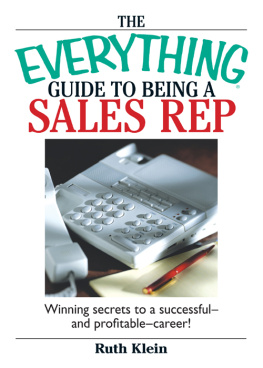
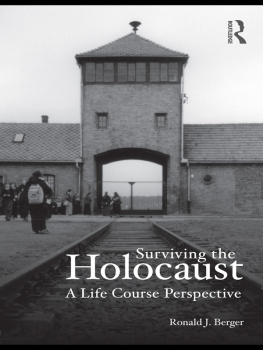
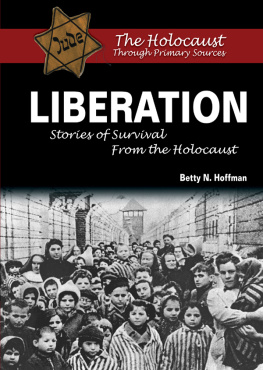
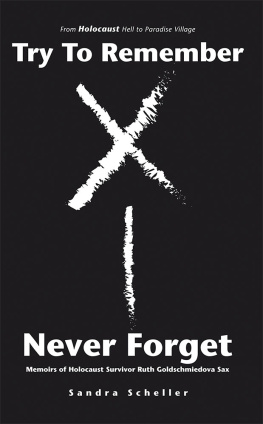
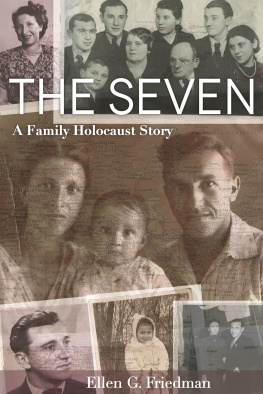
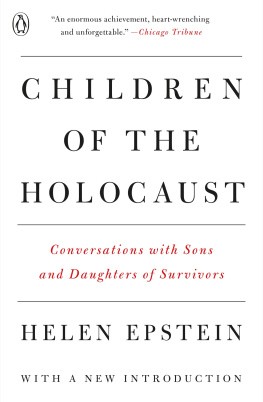
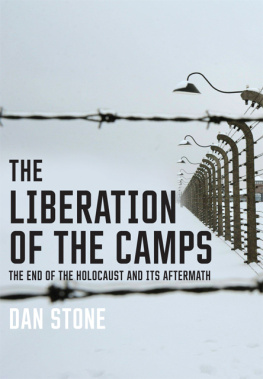


 CONTENTS
CONTENTS 